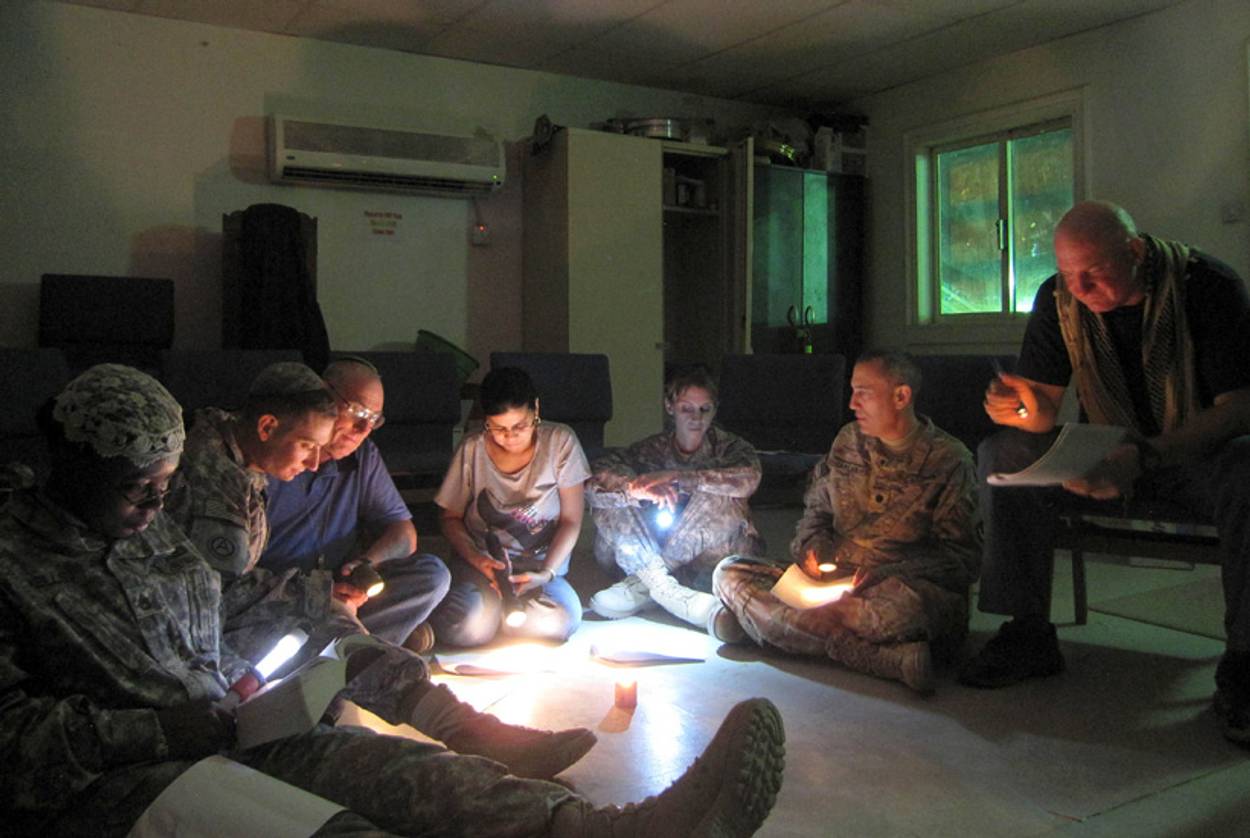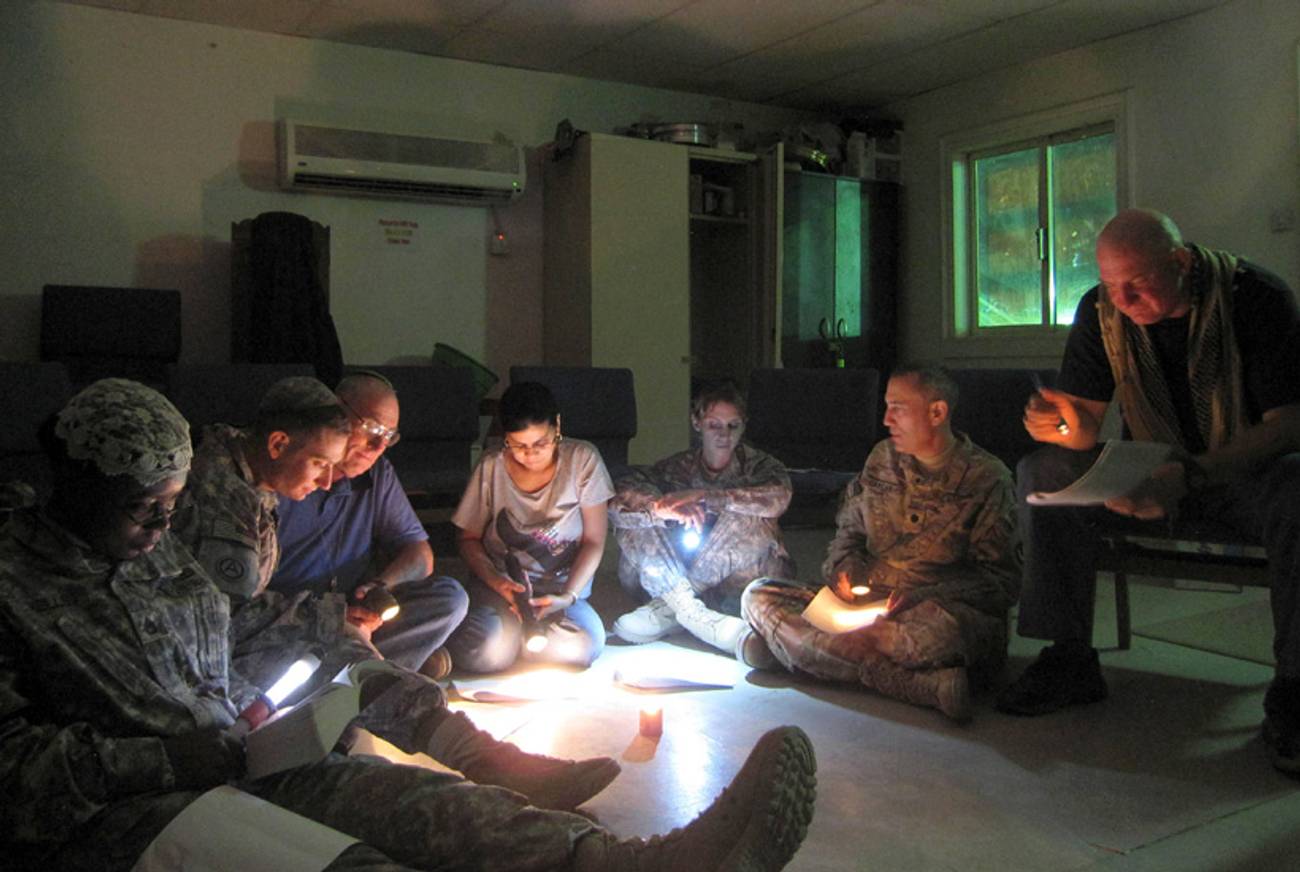Tisha B’Av on a Kuwait Military Base Gives a Chaplain a Lesson in Unity
The holiday never resonated for me, until I understood its message about connecting with other Jews—even Messianic ones




Tisha B’Av couldn’t come fast enough.
It was strange to be fixated on this holiday, since commemorating the destruction of the First and Second Temples had never figured prominently in my Reform Jewish upbringing on the Upper East Side of Manhattan, but 2012 was strange in a lot of ways. I was in Kuwait, halfway through my yearlong deployment as a U.S. Army Chaplain on the religious-support staff of a three-star general, and Tisha B’Av was suddenly meaningful for a deeply personal reason: R&R. The holiday coincided with my leave back to the States. A chance to see my family and friends would be the perfect antidote to six months of Army loneliness, and it was timed just right to carry my spirits through the second half of the tour.
The deputy command chaplain called to me: “Hey, Rabbi, can you come in here for a second?” I smiled to myself as I paused my online SERE training on the POW Code of Conduct and walked over to his office. How many times would I have to remind him that I was a cantor? I had just been explaining the distinction to him earlier, along with the observance of Tisha B’Av, my new favorite holiday, which was less than a month away.
“Bad news,” he said. “Your leave’s been canceled.”
I gasped, the blood draining from my face.
“New policy,” he said. “Same for all reservists.”
“But some of our soldiers have already come back from leave,” I protested. “Some of them are away right now!”
“I know it’s unfair, but there’s nothing we can do. This comes to us straight from Central Command and Department of the Army, effective immediately,” he said with a shrug. “Good news is you’ve only got six more months.”
I staggered out of his office. Six more months?! I wasn’t sure I’d make it. I looked at the SERE training on my computer. Survive, Evade, Resist, and Escape. To complete my last module I’d had to navigate a captured U.S. soldier out of the confines of an enemy prison. That was a mental direction better left unexplored, but the parallel seemed overwhelmingly enticing. Disappointment mushroomed into indignation, tinged with panic. This was a catastrophe! This was Tisha B’Av.
As the reality of my situation began to sink in, the frustration that I would be stuck in Kuwait without seeing my wife’s face for another six months gave way to the unwelcome realization that I would now be responsible for leading the Camp Arifjan Jewish community in some kind of Tisha B’Av observance as well. Knowing little about the holiday other than the fact that it was now my least favorite, I was surprised to learn that defeat, destruction, and infuriation weren’t the entirety of the story. Though I still suspected that modern-day U.S. Army leave policies were apparently being decided by descendants of Caligula, I was struck by how the tragedies of exile to Babylon and Rome had led to such unforeseen yet vital creations as the writing of the Torah and the establishment of the rabbinate—triumphs of Jewish resiliency and inspiration.
A few weeks later, on Erev Tisha B’Av, while my friends back home gathered on the Upper West Side for the reunion I had organized but would not be attending, I seated myself with six other members of our community on the floor of the darkened Zone 6 Chapel and began to chant from the Book of Lamentations. There were three who were born Jewish, two who had converted, and one who was in the process. It was the first time any of them had heard Eicha trope. We ended the evening by singing Hashiveinu to an old folk melody, our voices interweaving in the glow of our flashlights, each of us far from those we loved most. Listening to the music, I thought back to when I first found out I’d be spending Tisha B’Av in Kuwait, and marveled at how quickly I had reacted with resentment and outrage, failing to imagine what might be created instead. Now I could think of no better place to be than with my tiny congregation, leading them on a journey of Jewish discovery and relying on them for a community to support me until I returned home.
The composition of the congregation itself provided perhaps the most important lesson in my new appreciation for Tisha B’Av. As a Reform cantor, I was perfectly comfortable ministering to Jews of all backgrounds, and even non-Jews who had either married Jewish spouses back home or befriended Jewish personnel overseas. But one demographic in particular within the congregation tested my understanding of Jewish community in unexpected ways.
***
Early in my deployment, I was sitting around the chaplain’s office on a Saturday evening when one of the Jewish civilian contractors arrived with a personal box of Havdalah supplies, prepared to conduct the service on his own in the room across the hall. He was one of my favorite congregants and had enthusiastically participated in all the services and classes I had offered. “I’m so glad you’re here—let me join you!” I exclaimed, barging in. “It’s so great that you have these … ” I said, as I removed a beautiful braided candle and some spices from the box he’d brought.
“Well, that’s because of this,” he sheepishly interrupted, as he turned over a sheet of paper that had been in the box as well. It read: MESSIANIC JEWISH SERVICE.
It was sort of like the climactic moment in Harry Potter and the Sorcerer’s Stone, when Harry finds himself alone in the bowels of Hogwarts with Professor Quirrell, who has supposedly been responsible for his safety, only to discover that Lord Voldemort has been inhabiting the professor’s body the whole time. I’d like to think my face remained unbothered, but it felt as though my eyeballs were spinning like a slot machine as I tried to figure out what to do. Having invited myself to this guy’s private Havdalah service, was I really about to withdraw my support because—though my Jewish activities had been open to Christians, Muslims, atheists, and even the descendant of a Nazi train conductor—a Messianic Jew’s beliefs marked him for special discrimination?
Since childhood, my parents had taught me to avoid Messianic Jews at all costs, much as one would avoid body-snatching aliens or evil wizards. More recently, the issue of Messianic Jewish military chaplains had almost derailed my own efforts to become the first cantor ever endorsed for such work: Messianic Jews had petitioned the Department of Defense to recognize them as fully Jewish chaplains, instead of as one more denomination within Christianity, and only the unity of Judaism’s three major movements had thwarted their efforts. This unity was more severely tested by the idea of cantors serving as chaplains. Many rabbis protested that Jewish religious leadership, in both the military and civilian worlds, was their job alone, and I was allowed to proceed in spite of vociferous objections that allowing cantors to join them was a slippery slope that would end with Messianic Jews doing the same. Having never had the opportunity to engage in sustained dialogue with a Messianic Jew, my sideline view of these disputes had only furthered my impression that such people were now dangerous for both Jews in general and my chaplaincy aspirations in particular.
All of that changed once I arrived overseas. Just as my success at being a cantor and a chaplain softened the debate over its propriety, so too did my actual encounters with Messianic Jewish soldiers soften my initial feelings toward them. On every installation I visited, from Jordan to Afghanistan, men and women who considered themselves Messianic Jews came to my services not to proselytize but to seek relief from the loneliness of their deployments and a safe space to practice a version of Christianity that bothers almost as many Christians as Jews. After my awkward and unexpected introduction at Havdalah, I always welcomed them. But I never felt completely comfortable about it until that Tisha B’Av.
The Talmud teaches that the Second Temple was destroyed because of sinat chinam—baseless hatred between Jews. Jerusalem, it is said, had enough food stored to withstand the Roman siege for years, until rival Jewish sects began burning each other’s supplies and eventually reduced the entire populace to starvation. I’ve always believed that divisions and boundaries are essential for sacred life. Cantors are not rabbis, and Messianic Jews are not Jews. But while separation is holy, baseless hatred fueled by wild fear is not. I’ve found that the Jewish world is full of doomsday predictions—that all rabbis will be replaced by cantors and all cantors will be replaced by soloists, or that all liberal Jews will be converted by Messianic Jews and then everyone will be converted by Chabad—but only on my deployment was I forced to see how such attitudes take the fire that we could share to illuminate people’s lives in different ways and use it to disfigure each other instead. Good fences make good neighbors, as the poem goes, but if the fences get so high that you can’t even see your neighbor, you’ve got a problem.
Like most Reform Jews since the 19th century, I struggled to find meaning in the observance of Tisha B’Av because I thought it focused on the destruction of the Temple, and I found myself less troubled than relieved by the end of the sacrificial cult. I still believe that Judaism has evolved for the better in the 2,000 years since then, but I learned that to emphasize what is gone and not what has stayed is to miss the point. Perhaps Tisha B’Av takes us to the very darkest places of the human experience to make us realize that it doesn’t have to be that way. “Cause us, O God, to turn to you, and we will return,” the Book of Lamentations promises. In a world where we so easily stray from God the moment things don’t go our way, I discovered that a day to restore our understanding of what true suffering is and isn’t, of which differences are and aren’t important, and of the potential consequences when we mix those things up, is really a precious and sacred gift after all.
***
Like this article? Sign up for our Daily Digest to get Tablet Magazine’s new content in your inbox each morning.
David Frommer is the first cantor ever to serve as a chaplain in the U.S. armed forces.
David Frommer is the first cantor ever to serve as a chaplain in the U.S. armed forces.